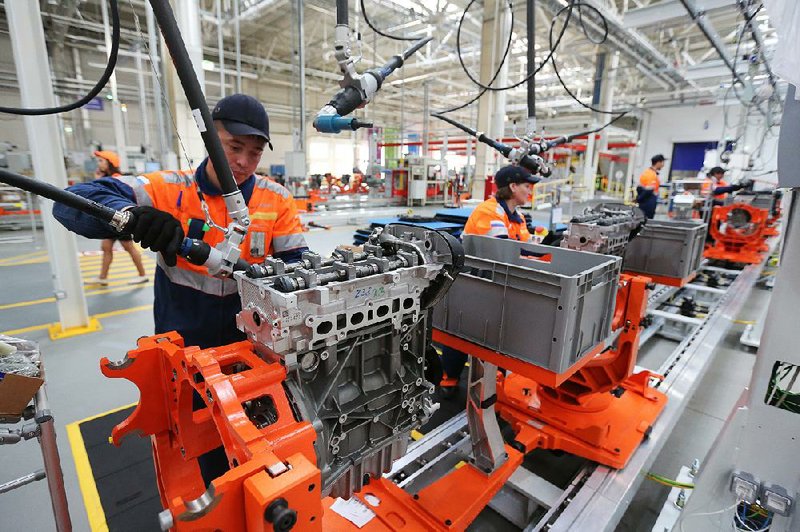Volkswagen AG and Ford Motor Co. are sticking with long-planned investments in Russian engine factories even as car sales there head toward a six-year low.
Volkswagen opened a $279 million plant Friday, and Russian Prime Minister Dmitry Medvedev attended a ceremony to mark the start of production. The factory near Kaluga, an industrial city southwest of Moscow where Volkswagen already produces vehicles, will have the capacity to make 150,000 engines a year for Russian-made VW-brand and Skoda cars, helping reduce prices, Marcus Osegowitsch, head of the carmaker's Russian unit, said at the event.
The factory was the second to start operating in Russia this week as Wolfsburg, Germany-based VW and Dearborn, Mich.-based Ford followed through on promises made in order to secure tax advantages and a foothold in the market. The U.S. company's Russian joint venture, Ford Sollers, spent $275 million on a plant in Elabuga, in the Tatarstan region, that opened Thursday. Earlier this year, French competitor Renault SA started building engines in the Samara region.
Russia has required international automakers to build factories in exchange for being allowed to import parts at zero or low tax rates.
Car manufacturers including Volkswagen may seek to change the terms of those agreements, Kommersant newspaper reported earlier this week. The companies want the government to make allowances for fluctuations in the value of the ruble when calculating how much of their production is local, a figure that's used to define whether the carmakers have met their obligations, a Volkswagen spokesman said by phone Friday.
There are no talks of moving component production out of Russia, the spokesman said. Some 30 percent of VW and Skoda vehicles built in the country will have locally made engines starting next year, Volkswagen said.
Russian car sales have slumped for seven months straight, dropping 28 percent in July as the economy falls into the first recession since 2009. Sales of new cars and light commercial vehicles may drop 36 percent this year to 1.55 million units, the lowest since 2009, according to the Association of European Businesses.
"If you had asked me even two to three months ago, I would say that we touched the bottom and the market will start recovering soon," Osegowitsch said in an interview Friday at the ceremony. "But now the situation looks less optimistic because of the unfavorable situation on the global market."
Volkswagen doesn't expect demand in Russia to recover in 2016, he said.
Business on 09/05/2015

